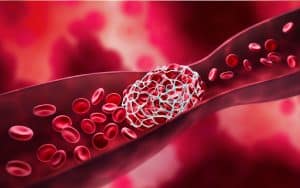It is a known fact that numerous people take blood thinners.
But when it comes to men, the question is whether these medications can affect erectile function and whether it’s possible to take them with standard erectile dysfunction treatments. Here is what the research says.
What are Blood Thinners?
Blood thinners are drugs which are used for treating, preventing and reducing the risk of blood clots formation and their embolization via the circulation to vital organs (such as the heart, lungs or brain), where they can lead to life threatening situations.
The main types of blood thinners include:
- Platelet aggregation inhibitors – these drugs inhibit the aggregation (the clumping together) process of blood cells called platelets, which is the first phase of blood clot formation. Common examples of platelet aggregation inhibitors include Aspirin and Plavix (Clopidogrel).
- Anti-coagulants – these drugs increase the amount of time it takes for blood clots to form, by inhibiting the production by the liver of proteins called ‘clotting factors’. The production process of clotting factors is vitamin k-dependent, and the anti-coagulant drug warfarin, for example, works by antagonizing vitamin K. Heparin is an example of an anti-coagulant drug given by injection.
Do Medications for Erectile Dysfunction Have Blood Thinning Effects?
Because the erectile dysfunction (ED) medication Viagra ® (sildenafil) was originally developed for treating angina pectoris (a type of chest pain due to poor blood flow), many people assume it has blood thinning effects. In practice, however, there is no scientific basis that reinforces the assumption that Viagra or other ED medications (such as Cialis or Levitra) have blood thinning effects.
In fact, Viagra belongs to a class of drugs called ‘PDE5 inhibitors’, which increase blood flow to the penis by affecting a natural chemical (called cGMP) involved in dilating penile blood vessels during sexual arousal. These medications help best when ED is caused by peripheral artery disease (i.e., a dysfunction in arterial penile blood supply). Due to their vasodilating effects, PDE5 inhibitors may also have a mild blood pressure lowering effect, as well as, inter alia, interactions with hypertension medications.
To sum up, it can be generally said that ED medications do not have blood thinning effects, and there are no known interactions between them and most blood thinners, except possibly with warfarin. However, if you are taking blood thinners and experiencing ED symptoms, it is important that you consult your physician about the safety of PDE5 inhibitors for treating ED, particularly if the blood thinners were prescribed due to a heart condition or disease.
Can Blood Thinners Affect Erectile Function?
In general, blood thinners do not cause or exacerbate ED symptoms.
If men who are taking blood thinners are experiencing ED, it’s important to know that their symptoms are not necessarily associated with the use of these drugs. Most patients who use blood thinners have one or more pre-existing medical conditions (such as hypertension, diabetes, cardiovascular disease, obesity etc.) which are regarded as independent risk factors for the development of ED. Therefore, it is likely that any of the pre-existing medical conditions, and not the blood thinners, are the cause of ED. It is noteworthy however, that researchers who conducted a literature review in 2017, have concluded that the class of drugs called thienopyridines, which inhibit platelet aggregation (like Ticlopidine for example), might in certain circumstances increase the risk of ED, decrease libido and sexual function. Likewise, priapism (a dangerous condition that causes prolonged erection) was found to be an uncommon but serious complication of treatment with certain anticoagulants.
Can blood thinners have otherwise beneficial effects on erectile function? To date, there is no verifiable scientific evidence that blood thinners can help with ED. Recently however (2020), a pilot clinical study found that aspirin (a platelet aggregation inhibitor) may help improve erection quality among men with vascular ED. Likewise, the aforementioned literature review (2017) have found that aspirin may benefit patients with lithium-induced ED. Still, it’s important to note that other studies on aspirin have not found similar beneficial effects, and additional larger studies are warranted to establish any potential benefits in the context of ED.
Can Blood Thinners be Taken with Nonpharmacologic Treatment for ED?
- Vacuum devices – although this treatment is regarded as safe for most men, there is an increased risk for bleeding when combining it with blood thinners, such as warfarin and Plavix.
- Penile injection therapy – there is an increased risk for bleeding when taking blood thinners such as warfarin and Plavix.
- Shockwave therapy – the patient should consult a physician. Some official sources do not recommend shockwave therapy for people who use anti-platelet medications (such as aspirin and Plavix) or anticoagulants (such as warfarin and Xarelto). Few limited studies, on the other hand, indicate the potential safety of taking platelet aggregation inhibitors during shockwave therapy.
- Vertica® Radio Frequency (RF) Technology – based on RF mechanism of action, it could be reasonably assumed there is no increased risk for bleeding when combining this treatment with blood thinning therapy. However, further research is warranted to support this assumption.
The Company hereby clarifies that the information contained on the website is for informational purposes only, and is not intended to be a substitute for professional medical and healthcare advice, and does not constitute medical advice or opinion. Always seek the advice of your physician or other qualified health provider with any medical condition or question you may have regarding a medical condition.





